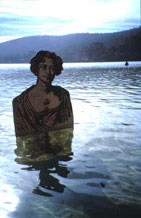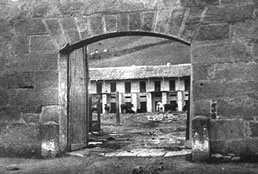
The first
research seminar for 2001 was held
on Friday 16 February at the early colonial homestead of Somercotes,
near Ross, in the midlands of Tasmania. See programme
and other details about the day.
The second
research seminar for 2001, Hybridity
and Diaspora, was held on Friday 27th July at the Hobart
Campus of the University of Tasmania. See programme
and other details about the day.
SOMERCOTES
SEMINAR
Friday 16 February
2001
Seminar held at the early colonial homestead of Somercotes, near Ross, in the midlands of Tasmania.
Programme

9.30-10.00 Essential business items
10.00-12.30 Papers
Pam Allen Hybrid Identities: The Progeny of Colonialism.
Julie Gough Trying Times: Visual Reconsiderations of Historical Narratives
Ian Green Colonialism and Its Linguistic Aftermath: Aboriginal English at Wallaby Cross
Barbara Hatley Coloniality, Sexuality and Modern Indonesian Writing
Herb Kimmel Governor Arthur's Press Gang
Greg Lehman The Mythic Proportions Of Palawa: Transformations in Tasmanian Indigenous IdentityEva Meidl A Donation to the Colony
Mike Powell The Colonial Contribution to Colonialism: Tasmanian Rev JF Goldie in the Solomons 1903-1948
Lunch followed by tour of the property for those who wish to go; others can sit under the trees and chat
2.00-2.30
Guest speaker - to be confirmed
2.30-4.00 Papers
Lucy Frost Unearthing Trugernanna: Preliminary Reflections on the Archeology of Memory
Anna Johnston Colonial Textuality and the Conscience of Empire
Deborah Malor Major Wingate's Masque
Anne Neale The Picturesque as Lion-Tamer: Living with the Sublime
Fiona Polack Of Knots and Rivers: Writing Newfoundland and Tasmania
Mitchell Rolls The Meaninglessness of Aboriginal Cultures
For further information please contact Anna Johnston, English and European Languages and Literatures, University of Tasmania.
Image courtesy of Julie Gough her Whispering Sands, 1988 series, © Julie Gough. See an online exhibition of art work by Julie Gough.
Somercotes was settled in 1823 by Captain Samuel Horton and is one of a select number of Australian properties that has remained in continual family ownership. Apart from the significant buildings and other artefacts remaining, it is the site of rich personal and cultural history.
As well as the Georgian homestead, the cottages built for the indentured labourers have been preserved and are now available as 4 star colonial accommodation, while the original ticket-of-leave quarters have been restored to serve as a small conference centre where the seminar will be held.
The homestead was built with every possible protection against the danger of attack by Aboriginals or bushrangers. All windows were fitted with a internal and external cedar shutters, the doors and windows were barred, while the courtyard was secured by a high sandstone wall topped with an iron palisade. Nevertheless, in 1843, Somercotes was attacked by the famous outlaw, Martin Cash, and two fellow bushrangers. In the affray a shot was fired that lodged in the architrave of the front door where it can be seen today. A contemporary account of the attack, written by an American convict, Samuel Snow, who was working on a neighbouring property, can be read on the International Centre for Convict Studies site.
HYBRIDITY
AND DIASPORA SEMINAR
Friday 27th July 2001
All sessions except the last will be held at the Staff Club at the
Hobart campus of the University of Tasmania
9.15 -10.35 Session 1
Pam Allen: The enigmatic Indo
The paper examines the status of the Indo (Eurasian) in colonial Dutch
East Indies and in postcolonial Indonesia to suggest that the Indos occupy
what Ashcroft, Griffiths and Tiffin call the 'psychological abyss between
cultures'.
Cassandra Pybus: Gilbert Robertson:
that troublesome mulatto
Gilbert Robertson, free settler, radical newspaper editor and Aboriginal
conciliator, son of a wealthy West Indian planter and his slave mistress,
fitted uneasily into the colonial gentry mould. This paper considers how
he embodies both the concept of diaspora and of hybridity.
11.00-12.20 Session 2
Mitchell Rolls: The Meaninglessness of Aboriginal Cultures
This paper considers the issue of cultural identites and whether they
fit within deterministic models of identity, or are more fluid and vulnerable
to assumption. In pointing to the existence of an Aboriginal diaspora,
the paper also considers the sort of cultural identity pursued and privileged
by the diaspora.
Julie Gough: The gaze, guise, ruse
of 'hybridity'
The paper considers how in current western thinking the 'now' operates
within the guise of dealing with the past and how the introduction of
terms like 'hybridity' is about obscuring and layering; twisting and binding,
and is ultimately distanced from reality.
12.20 -1.00 Session 3
Nigel Penn (University of Cape Town) 'Drosters', 'Bastaards' and 'Oorlams':
Hybrid societies of the Northern Cape frontier zone
The paper will consider the colonial interaction between the Boer
settlers and later the British with the imported slave community and the
indigenous Khoi and San people of the Cape.
2.00-3.20 Session 4
Kirsty Reid (University of Bristol): It cuts me even to the hart: Love
and Separation in the Convict Diaspora
The paper will examine a series of nineteeth century letters from
convicts and their families to explore the issues of love and separation
generated by the process of penal transportation.
Clare Anderson (University of Leicester):
Convict Women and Border Crossings in the Nineteeth Century Indian Ocean
World
This paper will explore the context in which women went from Australia
to Calcutta and elsewhere in the Indian Ocean and how ordinary working
people tapped into the oral culture of the Indian Ocean world, to become
part of the flow of people and information crossing the seas.
3.20 -4.00 Session 5
Barbara Hatley: The Tyranny of Authenticity: Female Identity and Women's
Writing in Post-Colonial Contexts
The paper will be looking mainly at Indonesian texts in a broad framework
exploring the particular way women in colonial/ postcolonial societies
experience authenticity and East-West hybridity as putative bearers of
authentic cultural tradition.
4. 00 Coffee and discussion of future seminars in this series
5.15 -6.30 Removing the Boundaries at the St Ives Lucy Frost and Susan
Ballyn (Barcelona University): Exiles of a Diaspora: the Sephardi
Convicts in V.D.L.
On the 500th anniversary of the expulsion of the Jews from Spain,
there were claims that the Sephardi were being written out of the record
as they had been pushed out of the space half a millenium before. This
paper will consider the Sephardi diaspora in London and those transported
to Van Diemens Land.
 $20.00
for staff and $10.00 for students incl lunch and coffee. Places
are limited.
$20.00
for staff and $10.00 for students incl lunch and coffee. Places
are limited.
For further information please contact Cassandra.Pybus@utas.edu.au.
The photograph of the
Female Factory is courtesy of Island Produce:
URL: http://www.islandproduce.com.au
email: info@islandproduce.com.au



